Log content with hyperlinks
1 Overview
2 Logger API for hyperlinks
2.1 Hyperlinks using Strings
2.1.1 For a single link using a String
2.1.2 For a list of links using Strings
2.2 Hyperlinks using HyperlinkElements
2.2.1 For a single link using an HyperlinkElement
2.2.2 For a list of links using HyperlinkElements
2.2.3 HyperlinkElement
3 Visited links notifications
3.1 No LinkIndexConverter
3.2 With a LinkIndexConverter
4 See also
2 Logger API for hyperlinks
2.1 Hyperlinks using Strings
2.1.1 For a single link using a String
2.1.2 For a list of links using Strings
2.2 Hyperlinks using HyperlinkElements
2.2.1 For a single link using an HyperlinkElement
2.2.2 For a list of links using HyperlinkElements
2.2.3 HyperlinkElement
3 Visited links notifications
3.1 No LinkIndexConverter
3.2 With a LinkIndexConverter
4 See also
The ScriptLogger is an interface which logs informations and errors during the script execution. Some of these methods allow to show hyperlinked content.
For example:
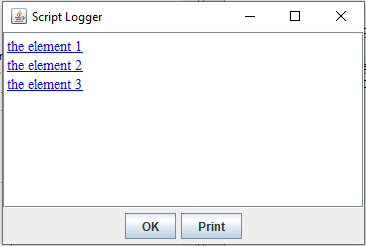
For example:
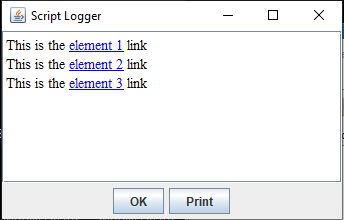
The logger also has the following methods methods which allow to show hyperlinks using HyperlinkElements:
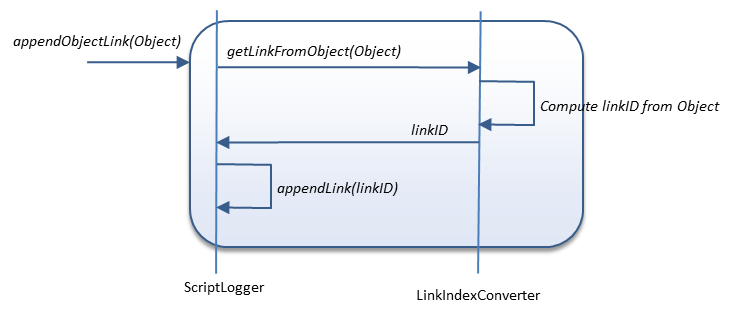
For example:

For example:
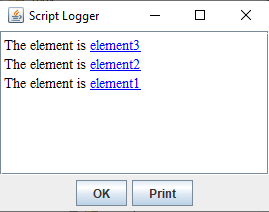
To be notified when an hyperlink is visited, you must register a ScriptLoggerHyperLinkListener with the ScriptLogger.registerHyperLinkListener(ScriptLoggerHyperLinkListener).
For example:
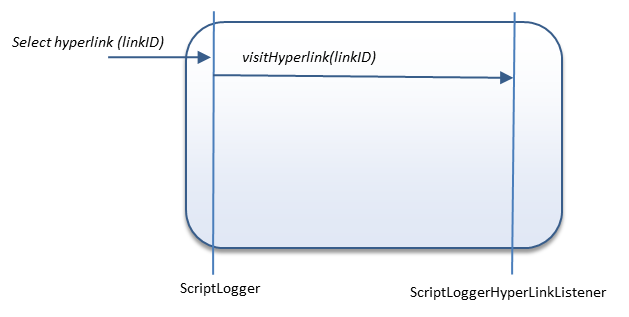
The ScriptLoggerHyperLinkListener.visitHyperlink(String) method will be called.
For example:
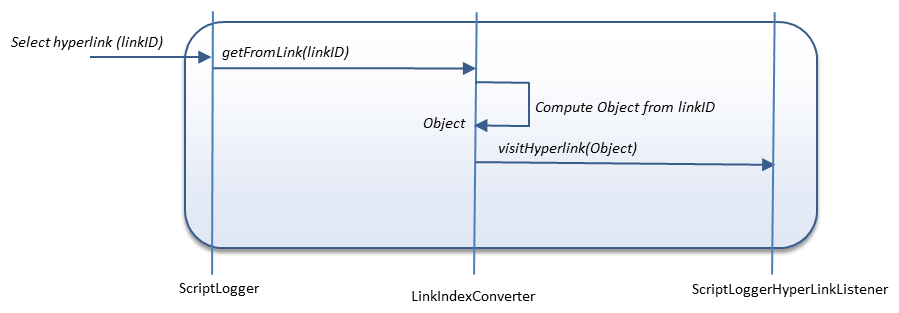
The ScriptLoggerHyperLinkListener.visitHyperlink(Object) method will be called.
For example:
Overview
It is possible to log hyperlinks in the ScriptLogger. This is based on several methods in the logger:- Methods which allow to append lines with hyperlinks specified as Strings
- Methods which allow to append lines with hyperlinks specified as Objects
- The ScriptLogger.registerLinkIndexConverter(LinkIndexConverter) method sets a LinkIndexConverter which converts an Object to a String (which will be used as a link description) and a String to an Object
- The ScriptLogger.registerHyperLinkListener(ScriptLoggerHyperLinkListener) method sets a ScriptLoggerHyperLinkListener which will be notified when a link is selected
Logger API for hyperlinks
Hyperlinks using Strings
The logger also has the following methods methods which allow to show hyperlinks using Strings:- The ScriptLogger.appendLink(String, String) appends a line of text, with an associated link reference, and a default color
- The ScriptLogger.appendLink(String, String, String) appends a line of text, with an associated link reference, and a specified html color
- The ScriptLogger.appendLinks(String, List) appends a line of text, with a list of link references, and a default color
- The ScriptLogger.appendArrayLinks(String, String...) appends a line of text, with an array of link references, and a default color
- The ScriptLogger.appendLinks(String, List, String) appends a line of text, with a list of link references, and a specified html color
- The ScriptLogger.appendColorArrayLinks(String, String, String...) appends a line of text, with an array of link references, and a specified html color
For a single link using a String
For a single link using a String, you must set the text shown for the link and the ID of the link.For example:
int i = 0; public void process(TreeElement element) { i++; String linkID = >the link ID generated from the element> logger.appendLink("the element " + i, linkID); }

For a list of links using Strings
For a single link using a String, you must set the text and the list of links. The text will contain a{[0-9 _A-Za-z]+} pattern for each link. The content inside the accolades will be used for the text of the link.For example:
int i = 0; public void process(TreeElement element) { i++; String linkID = >the link ID generated from the element> String text = "This is the {element " + i + "} link"; logger.appendLinks(text, linkID); }

Hyperlinks using HyperlinkElements
Main Article: LinkIndexConverter
The logger also has the following methods methods which allow to show hyperlinks using HyperlinkElements:
- The ScriptLogger.appendObjectLink(HyperlinkElement) appends a line of text, with an associated link reference using the provided element to create the link, and a default color
- The ScriptLogger.appendObjectLink(HyperlinkElement, String) appends a line of text, with an associated link reference using the provided element to create the link, and a specified html color
- The ScriptLogger.appendObjectLinks(String, List) appends a line of text, with an associated link reference using the provided elements to create the links, and a default color
- The ScriptLogger.appendObjectLinks(String, List, String) appends a line of text, with an associated link reference using the provided elements to create the links, and a specified html color
- The ScriptLogger.appendObjectLinks(String, HyperlinkElement...) appends a line of text, with an associated link reference using the provided elements to create the links, and a default color
- The ScriptLogger.appendObjectLinks(String, HyperlinkElement...) appends a line of text, with an associated link reference using the provided elements to create the links, and a specified html color

For a single link using an HyperlinkElement
TheHyperlinkElement contains both the link associated text and the element associated with the link. The element will be converted to a link ID with the associated LinkIndexConverter.For example:
public void process(TreeElement element) { HyperlinkElement linkElt = new HyperlinkElement("the text shown for the link", element); logger.appendObjectLink(linkElt); }

For a list of links using HyperlinkElements
For a single link using a String, you must set the text and the list of links. The text will contain a%\d+ pattern for each link, and will refer to the i-th HyperlinkElement in the arguments.For example:
public void process(TreeElement element) { HyperlinkElement linkElt = new HyperlinkElement(element.name, element); logger.appendObjectLinks("The element is %1", linkElt); }

HyperlinkElement
The HyperlinkElement contains:- The object which is used for the hyperlink
- The text which will be shown for the hyperlink
public void process(TreeElement element) { HyperlinkElement linkElt = new HyperlinkElement("the text shown for the link", element); logger.appendObjectLink(linkElt); }
Visited links notifications
Main Article: ScriptLoggerHyperLinkListener
To be notified when an hyperlink is visited, you must register a ScriptLoggerHyperLinkListener with the ScriptLogger.registerHyperLinkListener(ScriptLoggerHyperLinkListener).
For example:
GroovyScriptWrapper<Script> wrapper = new GroovyScriptWrapper<Script>() { }; ScriptLoggerHyperLinkListener linkListener = new MyLoggerHyperLinkListener(); ScriptLogger logger = new DefaultSwingScriptLogger(); logger.registerHyperLinkListener(linkListener); wrapper.setScriptLogger(logger);The method called for a visited link notification depends on if a LinkIndexConverter has been registered or not:
- The ScriptLoggerHyperLinkListener.visitHyperlink(String) will be called if no LinkIndexConverter has been registered
- The ScriptLoggerHyperLinkListener.visitHyperlink(Object) will be called if a LinkIndexConverter has been registered
No LinkIndexConverter

The ScriptLoggerHyperLinkListener.visitHyperlink(String) method will be called.
For example:
public class MyLoggerHyperLinkListener implements ScriptLoggerHyperLinkListener { @Override public void visitHyperLink(String linkID) { // get the associated elemet from the linkID and do something with it } }
With a LinkIndexConverter
Main Article: LinkIndexConverter

The ScriptLoggerHyperLinkListener.visitHyperlink(Object) method will be called.
For example:
public class MyLoggerHyperLinkListener implements ScriptLoggerHyperLinkListener<TreeElement> { @Override public void visitHyperLink(TreeElement element) { // do something with the tree element } }Note that you are not required to specify the type of the Object used for the
ScriptLoggerHyperLinkListener, If you don't do it, you will have this method to implement:public class MyLoggerHyperLinkListener implements ScriptLoggerHyperLinkListener { @Override public void visitHyperLink(Object o) { // do something with the Object } }
See also
- LinkIndexConverter: This article explains how the LinkIndexConverter works in the context of the logger
- ScriptLoggerHyperLinkListener: This article explains how the ScriptLoggerHyperLinkListener works in the context of the logger
- ScriptLogger: This article is about the ScriptLogger
×
![]()
Categories: api